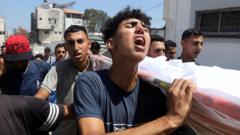The latest developments in the Middle East have seen Israel ordering residents in parts of a Beirut suburb to evacuate due to escalating tensions with Hezbollah, raising concerns of renewed conflict in the region.
Israel Demands Evacuation of Beirut Suburbs Amid Heightened Tensions

Israel Demands Evacuation of Beirut Suburbs Amid Heightened Tensions
Evacuation orders issued by Israel for areas near Beirut signal a precarious situation following months of cease-fire.
Israeli military officials instructed residents near the Hadath neighborhood of Dahiya, an area known for its Hezbollah presence, to leave immediately following rocket fire aimed at northern Israel. This announcement was the first evacuation order since a U.S.-mediated cease-fire took effect in November after intense fighting in Gaza. Avichay Adraee, a spokesperson for the Israeli military, shared a map of the target area on social media, highlighting a building and indicating a proximity evacuation radius of 300 yards.
The tensions reignited after a Hamas-led incursion on October 7, 2023, which triggered a significant escalation of hostilities, including Hezbollah's involvement by launching rockets in solidarity with Hamas. Since the cease-fire, while Hezbollah has often maintained a lower profile, Israeli military actions against various militant sites in southern Lebanon persisted, escalating fears among residents, particularly in Dahiya, a stronghold for Hezbollah.
On Friday morning, the situation escalated further as air raid sirens pierced through Kiryat Shmona in northern Israel. Israeli military reports indicated that some incoming projectiles were intercepted, although one landed inside Lebanon. Hezbollah, however, denied any involvement in the rocket fire and reaffirmed its commitment to the cease-fire.
Israeli Defense Minister Israel Katz warned of potential retaliatory strikes on Beirut if rocket attacks continue, stating, "If it’s not quiet in Kiryat Shmona... it shall not be quiet in Beirut." This rhetoric marks a dangerous threshold, suggesting a willingness to intensify military action if deemed necessary.
In Dahiya, panic ensued as residents reacted to the evacuation order; gunfire echoed as locals sought to warn others of the Israeli military's threat. Elie Hachem, director of a nearby hospital, expressed concern for the community’s well-being amid the chaos: “People are panicking,” he remarked, describing the reactions seen on the streets.
Currently, the hospital's staff remained on-site, focusing on maintaining calm among those in their care despite the damage previously inflicted during the last bout of conflict, reinforcing the fragile nature of stability that residents in these areas face.
This precarious situation demands close monitoring, as the region seems poised on the brink of another potential escalation, with past experiences reminding all involved of the dire consequences of conflict.
Hwaida Saad and Dayana Iwaza contributed reporting from Beirut.
The tensions reignited after a Hamas-led incursion on October 7, 2023, which triggered a significant escalation of hostilities, including Hezbollah's involvement by launching rockets in solidarity with Hamas. Since the cease-fire, while Hezbollah has often maintained a lower profile, Israeli military actions against various militant sites in southern Lebanon persisted, escalating fears among residents, particularly in Dahiya, a stronghold for Hezbollah.
On Friday morning, the situation escalated further as air raid sirens pierced through Kiryat Shmona in northern Israel. Israeli military reports indicated that some incoming projectiles were intercepted, although one landed inside Lebanon. Hezbollah, however, denied any involvement in the rocket fire and reaffirmed its commitment to the cease-fire.
Israeli Defense Minister Israel Katz warned of potential retaliatory strikes on Beirut if rocket attacks continue, stating, "If it’s not quiet in Kiryat Shmona... it shall not be quiet in Beirut." This rhetoric marks a dangerous threshold, suggesting a willingness to intensify military action if deemed necessary.
In Dahiya, panic ensued as residents reacted to the evacuation order; gunfire echoed as locals sought to warn others of the Israeli military's threat. Elie Hachem, director of a nearby hospital, expressed concern for the community’s well-being amid the chaos: “People are panicking,” he remarked, describing the reactions seen on the streets.
Currently, the hospital's staff remained on-site, focusing on maintaining calm among those in their care despite the damage previously inflicted during the last bout of conflict, reinforcing the fragile nature of stability that residents in these areas face.
This precarious situation demands close monitoring, as the region seems poised on the brink of another potential escalation, with past experiences reminding all involved of the dire consequences of conflict.
Hwaida Saad and Dayana Iwaza contributed reporting from Beirut.






















